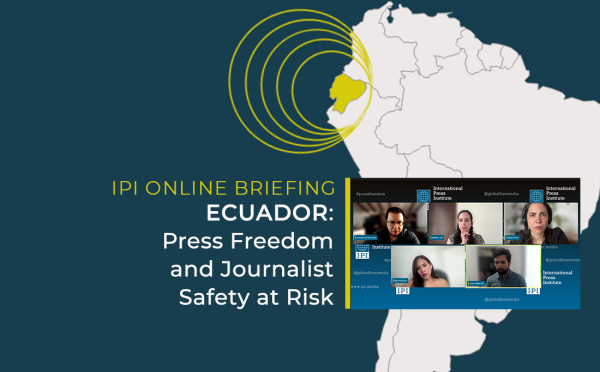The International Press Institute (IPI) today welcomed reports that the Revolutionary Armed Forces of Colombia (FARC, according to its Spanish acronym) planned to free a French journalist captured during a military shootout more than two weeks ago, but reiterated that the release should be immediate and unconditional.
The International Committee of the Red Cross (ICRC) announced on Sunday that it had received a statement from FARC in which the leftist rebel group communicated its intention to release Roméo Langlois, a long-time Colombian correspondent for France 24 television, but failed to specifiy a date or location.
According to the ICRC, FARC has requested an envoy consisting of the ICRC, former Colombian senator Piedad Córdoba, and a representative of French president-elect Francois Hollande to negotiate the journalist’s release.
Langlois had been accompanying Colombian soldiers on a mission to destroy FARC cocaine farms when he went missing during a clash with guerilla fighters on April 28. FARC later released a statement confirming it was holding Langlois as a “prisoner of war”, emphasising that the journalist had been dressed in military clothing at the time of his capture.
In the statement, FARC asserted that journalists whom the Colombian military allows on its missions “do not fulfill the impartial purpose of reporting on reality, but rather of manipulating it to aid the war against the Colombian people”. The group added: “The minimum that can be expected [for a release] is the opening of a national and international debate over the freedom to inform”.
Colombian Defense Minister Juan Carlos Pinzón last week rejected FARC’s demands, insisting that the group “cannot impose conditions of any kind” and “must free him [Langlois] as soon as possible”. He added: “They can’t call him a prisoner of war. … He’s a civilian, a citizen, a journalist. He was doing his job,” according to Colombian media.
News reports indicated that Langlois had removed his bullet-proof vest and helmet during the clash in an attempt to identify himself to the rebels as a journalist. Following the kidnapping, President Juan Manuel Santos Calderón declared that “Colombia and the whole world” were waiting for FARC to make good on a February pledge to cease civilian kidnappings.
IPI Acting Deputy Director Anthony Mills said: “We are pleased to hear that FARC has decided to release Mr. Langlois, but we are concerned at the apparent terms linked to his freedom. FARC must release Mr. Langlois immediately and without conditions. Holding a journalist hostage and using him as a political pawn is unacceptable.”
Córdoba has acted on multiple occasions as an official government negotiator to FARC, helping to secure the release of hundreds of hostages. However, her relationship to the rebel group has been the subject of major controversy: in 2010 she was banned from public office for 18 years for suspected ties to FARC.
Speaking in response to FARC’s demand for her participation, Córdoba called Langlois’s kidnapping a human rights violation, but said the fact that Langlois was outfitted in military gear was “worrying.” Reports today indicated Córdoba has signalled her willingness to participate in possible negotiations.


